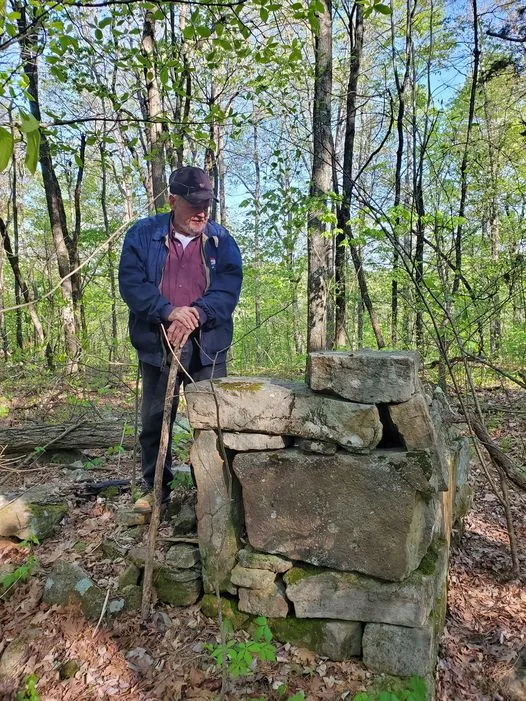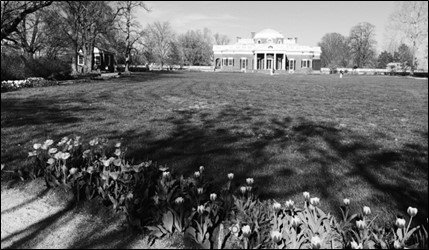I pulled up to my great uncle’s house around 7:30 on a Saturday morning. Our goal was to find mushrooms, but what it evolved into was so much better than any sackful of morels could ever be!
We left his house and headed to Cowell, on Highway 7, and took the dirt road that winds back down the mountain. As we drove I began asking him about the houses along the way.
We passed a red house on the left that he informed me was once the home of my great-great aunt and uncle, Alvin & Goldie (Freeman) Solomon. He recounted happy nights there and stories about Alvin, who was quite the character! My aunt Goldie is actually still with us, in her early 90s!
As we dropped off the mountain he pointed out more homeplaces, naming the ‘old timers’ that settled on the mountain and built farms out of the rocky hillsides and hollers. Beautiful, improved spots with tremendous views. Sadly, Carl lamented, many ‘foreigners’ (meaning people from somewhere else) have moved in and bought up many of these places. But, to happier times we were bound, and down the mountain we started.
Carl lived in the woods, and it’s apparent as we make out first stop, out near the place his brothers camp and deer hunt ever year. We exit and take off through the woods, looking for a certain ash tree. Though we found no morels, Carl walked us into a large patch of golden seal, and recalled digging it when he was young ‘Takes a lot to make a pound, and believe it was five dollars a pound.’ We also found some small ginseng, which he pointed out or I would’ve stepped over it! Back to the rig, we loaded up and made our way out.
Carl stopped and pointed out the tracks, naming each one, and we began to find hog and coyote sign. He told of trapping coyotes years back on this very mountain. As we discussed it, we passed the Hudson Mountain Road, and Carl related ‘There’s an old school house in the woods out there.’ I asked if we had time to go to it, and he replied ‘Well, if we don’t, then we’re short timers!’ We laughed as we turned around and soon were parked and climbing the slightly steep bank. About 100 yards into the woods we find the chimney still partially standing, and nearby a large rock pile that we couldn’t quite make out. We discussed it and Carl tells me that this is the remains of the Macedonia School. I’d heard of it but never saw it. Carl pointed out the area where he shot a large buck one year, telling me ‘Came to my stand late one winter day, snow was on, and seen the white flag goin up and runnin’ off. So I tracked him about 300 yards til he was close to the school here, and got him!’
On down we went, and stop at the John LeMarr place, now only a foundation, and Carl tells about coming here and getting John’s sweet potatoes, for which he was locally famous! His wife, Nancy, only had one leg, and Carl recalled how it didn’t slow her down, working about the house. ‘Dark old house, like most was, only one window or so.’ They lived out their lives here on this mountain, and now we enjoy an early dinner in their front yard, taking in the view and enjoying the sunshine.
Back and on down the mountain we go, enjoying the slightly warming sun and the lesser wind here below the point. We pull off towards Ricketts Mountain, Carl telling me he always heard it referred to as ‘Holt Mountain’ as I had. We walked another spot and Carl pointed out more plants; here was ‘blood root’ which he dug up with his walking stick and broke in half, exposing the blood like substance within. Carl said when the played ‘Indians’ it made great war paint! I put some on my hand and had to agree with him! Nearby was stinging nettle, which Carl dug up carefully for tea, and also another herb I can now identify, but can’t remember the name of! We dug up the roots, wiped them off and chewed them, and it was delicious! However, no mushrooms found, we took back off.
We stopped at the ‘Tom Spring’ named for Tom Sexton, and Carl pointed out more things nearby, snacking on some watercress while I got a drink from the beautiful, clear spring. ‘Everything has a purpose.’ Carl tells me, pointing out more edible plants and telling stories of walking these woods in his youth, trapping and hunting. He knows these woods like the back of his hand, and the people that inhabited them.
We got down below the road and Carl points out this is the ‘Columbus Gate Field.’ When I look at him he laughs, recalling that Tom Sexton once caught his boys goofing off when they should be working, loafing around and eating sugarcane. Tom caught one of them and thrashed him pretty good. The other boy got away and when his brother asked him where he went while he was getting whipped, the brother replied ‘I was jumpin the Colmbus Gate!’
Carl pointed out an ‘Indian Turnip’ and told me to peel it and stick my tongue to it. I did, and quickly saw that Carl pulled a fast one on me! My tongue tingled for an hour after that, like pins and needles! Carl laughed and said ‘Every country boy needs to do that once!’ He recalled once doing that to a young friend of his many years ago, and the friend hollering so loud his mom came out and said ‘What have you boys done to him??’ Carl replied that the man had stuck his tongue to an Indian Turnip, to which the mother turned to the squalling young man and said ‘Well, you durn fool, what’d you think would happen??’
Back and on down the mountain, Carl pointed out the location of the Dry Creek School, which he attended briefly as a child, walking all the way from his dad’s place, further down the creek, with some other children. We discussed where they found Ivan Russell dead in his car, and an alleged murder that my grandpa told me about many years ago, of which all the participants have now died. We eye that pond suspiciously, and Carl says ‘I’d like to drag that pond and see what I come up with!’ We laugh and go on, with Carl telling hunting stories and pointing out spots of importance to him.
We come out and take the dirt road to Mt. Judea, passing the spot where Carl was raised and by the first house he built when he got married, with instruction from John Kelly, a ‘foreigner’ from Texas. Carl said he wouldn’t get up off his stump and help him, but his advice was good! Said by the time the house was done, Carl was getting pretty good at it!
We would have more time together that day, but this was truly the highlight of it. We stopped and harvested some polk salad to eat later, Carl yet again proving he was a master of the woods, knowing all these herbs and plants and their uses.
That day with Carl was just one day in my life, and it will always be a treasured one. It was truly a great day to see some historical sites and learn about those who came and went before me. People still alive in Carl’s memories and stories. Through him, they have gained eternal life in their words and deeds, good and bad. This day with Carl was an amazing one.
Again, I implore you; get out and check on your loved ones. One day they will be gone, the elders of your families, and their priceless knowledge may be lost, will be, for certain if someone doesn’t take interest. Besides, it’d be great fun for them to get out and see their old stomping grounds.
As Carl once poignantly said ‘Everything has a purpose.’ So make yours to know your elders and record their stories.







Great article. Especially considering the remark (quoted) ‘Everything has a purpose.’ So, make yours to know your elders and record their stories.
Today the motive, it seems, by the youthful “moderns” is to denigrate one’s elders, record their stories and spit on their graves. Youth often lies as a condition of their large vacancy of knowledge as a result of, necessarily, a small vacancy of study.
“The children now love luxury; they have bad manners, contempt for authority; they show disrespect for elders and love chatter in place of exercise. Children are now tyrants, not the servants of their households. They no longer rise when elders enter the room. They contradict their parents, chatter before company, gobble up dainties at the table, cross their legs, and tyrannize their teachers.” Socrates